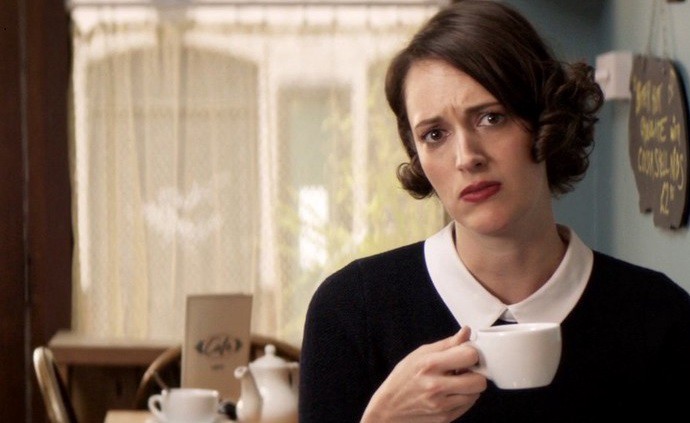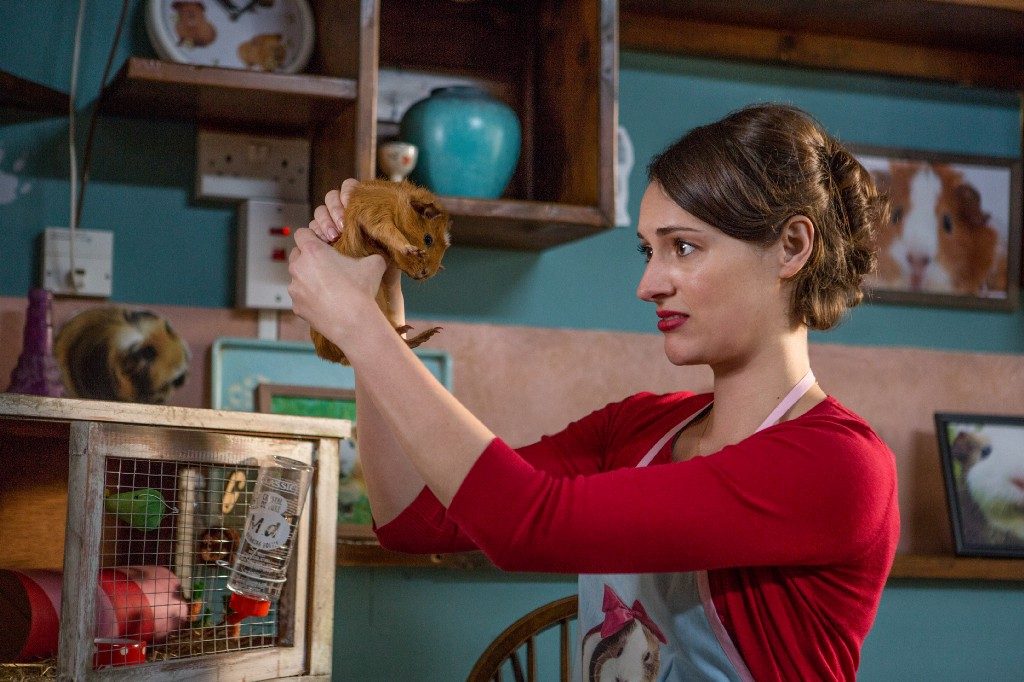
Traditionally, female narration has taken place rather ethereally, as if the character is allowing us a genteel peek into her diary: One of its most iconic examples, Bridget Jones, has just returned to theaters, still guiding us through her awkward life in plucky, article-deprived sentences. Not so the lead in Amazon Prime’s new show “Fleabag,” (available now) who busts through the fourth wall with a vocabulary of invective that would make Ryan Reynolds’ Deadpool blush.
Playwright and actor Phoebe Waller-Bridge, adapting this six-part series from her one-woman, 2013 Edinburgh show, is “Fleabag,” a single Londoner with a penchant for casual, disappointing sex and a cripplingly heavy load of grief over the recent death of her best friend and café co-owner, Boo (Jenny Rainsford), whose demise will gradually become a bigger part of the narrative.
Fleabag talks straight to us right out of the gate, not sparingly but a good part of the time, describing her sex life in second person like a feminist riff on “Bright Lights, Big City.” By maybe the third minute in, she’s having anal sex with a guy who’s so grateful about it the next morning that she ponders, to the camera, “Do I have a massive asshole?”
There is a marvelous delicacy about Waller-Bridge’s looks, accented with trench coats and a curly bob; put her in black and white and she’d look right at home in a 1940s noir. She has a classic screen-siren vibe, which makes her character’s brazenness all the more startling (in the same episode, she starts masturbating to a President Obama speech while her sometime-boyfriend’s asleep in the bed next to her).
She has a fraught relationship with her sister (Sian Clifford), polished, wealthy, and “probably anorexic.” Their mother is dead and their callous father (Bill Paterson), who seems to want no part of a relationship with either of them beyond “signing us up for feminist lectures,” has remarried a woman (the always wonderful Olivia Colman) who is, as Fleabag puts it, “not evil. Just a cunt.”
The feminist lectures seem to have endured as a pastime for the sisters, who do not particularly enjoy each other’s company. Watching a series called “Women Speak,” they are the only two in the audience who raise their hands when the speaker asks who would trade five years of their life to have the perfect body. They are bad feminists, Fleabag suggests, but the very ease with which she delivers withering take-downs of lame patriarchal bullshit suggests otherwise.
Her brother-in-law (Brett Gelman) is a sloppy drunk who, she tells us, is grossly sexually inappropriate most of the time, and the type of guy who will give you a hard time for calling him on any of it because come on, it’s just a joke.
That said, Fleabag is pretty adept at bad behavior herself: She rolls her eyes at the camera mercilessly when it comes to male suitors, especially her long-suffering musician boyfriend (Hugh Skinner) whose temporary breakups with her seem to have become part of the fabric of their relationship. (Occasionally, she says, she’ll split up with him just because the apartment needs a good cleaning, which is part of his departure ritual.) She has a lot of sex but doesn’t seem to particularly enjoy most of it; as she says, she craves the drama of it more than the actual physical pleasure.
There are moments when she descends into the genuinely cruel, daring you to laugh anyway (which you probably will). After exchanging flirty glances with a man on the bus, he breaks into a wide grin, displaying an outrageously huge pair of buck teeth. She grimaces at the camera. And yet, later on, it’s her bucktoothed suitor who throws her under the bus at a party, boasting of how easy it is to get women these days and how Fleabag begged him to take her number. For every casual unkindness perpetrated by our bitter heroine, there seems to be an equal — and quite often surpassing — slight against her.
Waller-Bridge also manages to retain some of the show’s theatrical origins; the start of the second episode, an elegantly choreographed visual gag about PMS, feels as if it belongs on the stage. And as an overarching theme (full disclosure, I’m only three episodes in), Fleabag’s struggle with depression after the death of her friend is a subtle but unmistakable ingredient to everything she says and does. The show is a complicated blend of grief, sadness, frustration with trying to be a good feminist, sexual frankness, and the desire to state one’s feelings outright in a manner more often associated with male protagonists (Ferris Bueller is the one who’ll spring to mind, if you’re of a certain age).
It’s also just full of inspired details, like the fact that her café is tricked out with guinea pig paraphernalia (and an actual guinea pig) in homage to her departed friend, to whom she gave the squeaky little rodent as a gift. A purloined bronze sculpture of a woman’s naked torso plays a recurring role in the series, as if to underline the focus on carnality. A man Fleabag sees in the graveyard when she goes to visit is there every day, apparently visiting a different grave; they wave congenially at one another.
In interviews, Waller-Bridge gets comparisons to “Girls” and “Bridget Jones” and other stories with flawed women at their center. “I feel like the comparisons are made because they come from a similar place in the women that are writing them — they are just writing about women,” she says. “I’m a huge fan of basically anything written about complicated, contradictory women. I’m drawn to them really quickly. I feel like it’s important that they keep coming.” You and me both, sister!







